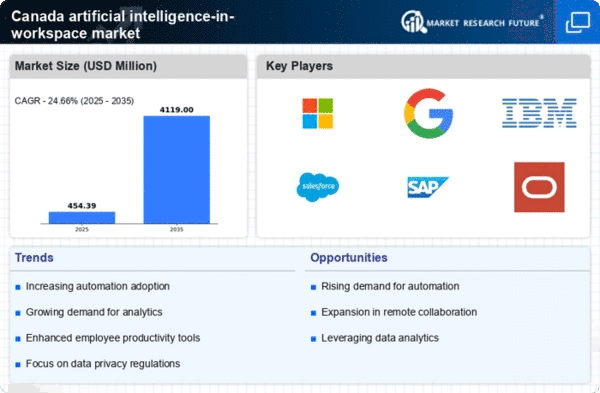Rising Demand for Efficiency
The artificial intelligence-in-workspace market in Canada is experiencing a notable surge in demand for efficiency across various sectors. Organizations are increasingly adopting AI technologies to streamline operations, reduce costs, and enhance productivity. According to recent data, businesses that integrate AI solutions report an average productivity increase of 20-30%. This trend is particularly evident in industries such as finance and manufacturing, where AI-driven analytics and automation tools are transforming traditional workflows. As companies strive to remain competitive, the push for efficiency is likely to drive further investments in AI technologies, thereby propelling the growth of the artificial intelligence-in-workspace market.
Growing Focus on Data Security
As organizations in Canada adopt AI technologies, the emphasis on data security within the artificial intelligence-in-workspace market is intensifying. Companies are increasingly aware of the potential risks associated with AI, including data breaches and privacy concerns. Consequently, there is a rising demand for AI solutions that incorporate robust security measures. The market is witnessing innovations in AI-driven cybersecurity tools that help organizations protect sensitive information while leveraging AI capabilities. This focus on data security is likely to shape the development of AI technologies, ensuring that they align with regulatory standards and consumer expectations.
Integration of AI in HR Processes
Human resources departments in Canada are increasingly leveraging AI technologies to optimize recruitment and employee management processes. The artificial intelligence-in-workspace market is benefiting from this trend as organizations utilize AI-driven tools for talent acquisition, performance evaluation, and employee engagement. Reports indicate that companies employing AI in their HR functions can reduce hiring time by up to 50% and improve employee retention rates by 15%. This integration not only enhances operational efficiency but also fosters a more data-driven approach to human resource management, which is becoming essential in today's competitive landscape.
Shift Towards Remote Work Solutions
The artificial intelligence-in-workspace market is adapting to the ongoing shift towards remote work in Canada. Organizations are seeking AI-driven solutions that facilitate collaboration and communication among distributed teams. Tools that utilize AI for virtual meetings, project management, and workflow automation are gaining traction. Data suggests that companies implementing AI-enhanced remote work solutions experience a 25% increase in team productivity. This trend indicates a significant opportunity for growth within the artificial intelligence-in-workspace market as businesses continue to invest in technologies that support flexible work arrangements.
Emergence of AI-Driven Decision Support Systems
The artificial intelligence-in-workspace market is witnessing the emergence of advanced decision support systems that leverage AI to enhance strategic planning and operational decision-making. Organizations in Canada are increasingly adopting these systems to analyze vast amounts of data and generate actionable insights. This trend is particularly relevant in sectors such as healthcare and finance, where data-driven decisions can significantly impact outcomes. The integration of AI in decision-making processes is expected to improve accuracy and speed, thereby driving the growth of the artificial intelligence-in-workspace market as businesses seek to harness the power of data.
















